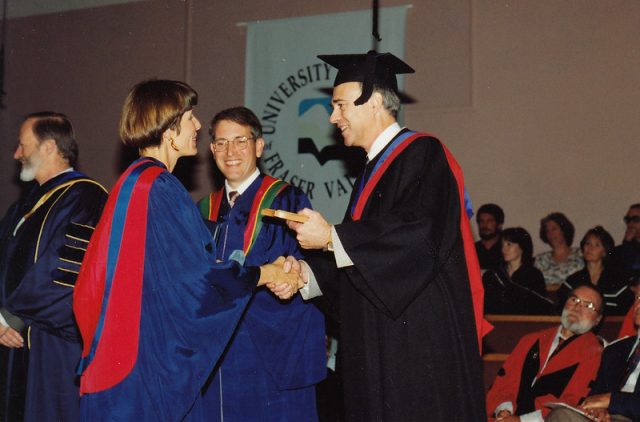
Dr. Jack Gaston, the founding member of the History department, passed away on September 17, 2024.
Jack had been living in Victoria with his wife Nicole since his retirement in 2008.
Founding Fraser Valley College Dean of Instruction Dick Bate hired Jack as the first history instructor for the college in 1975. He was the only history instructor for several years and was instrumental in building the history curriculum at the young college.
Jack was also chair of the Fraser Valley College Access committee in 1990/91, which led the campaign to gain university-college status for the college, allowing for the expansion into third- and fourth-year programming. As a result, FVC became the University College of the Fraser Valley in 1991. Due to the success of the campaign he helped lead, FVC became UCFV, and began developing bachelor’s degree programs, which led to the hiring many dozens of new faculty members. The university-college era set the stage for the institution to become a full university 17 years later in 2008.
Here’s an excerpt from a story from the UFV Today blog in 2022, chronicling the campaign to become a university college in the 1990s:
When Fraser Valley College (FVC) became UCFV, those who worked together to plan how the institution would integrate third- and fourth-year programming knew they wanted to be innovative. But they also wanted to hold onto what was best about the college model, including a wide breadth of programming, accessibility for a wide range of students, and a community focus.
A Bachelor of Arts with traditional disciplines of study was planned as a cornerstone offering, but those involved also wanted to capitalize on the strengths of UFV’s two-year, career-focused applied programs.
Dr. Jack Gaston chaired the Access committee that advocated for third- and fourth-year programming.
“The Fraser Valley as a whole was changing and growing in the late 1980s and early 1990s,” he recalls. “University education was becoming increasingly important. It was becoming more of a knowledge economy. Increasingly, students regarded two years of academic studies as a down payment on a four-year degree.”
Once the move to upper-level programming was announced, Gaston and others worked to build a new type of university.
“The ethos of the college, the community focus, was our strength, along with good teaching, small classes and a growing community in the Fraser Valley. Moving into degree-level programming opened a whole new world for us, building on our strengths. It was a case of broadening what we were already good at doing. It was a very exciting time when the government announced in 1991 that FVC would expand as UCFV to offer degrees in the Fraser Valley.
“In an ironic twist of events, we were at risk of losing a great deal, but at the end of the day we made huge gains. Receiving university-college status ensured our future.”
Within a year of gaining university-college status, UCFV held a conference called A Question of Balance, with the goal of articulating how the growth in academic studies would be balanced by continuing to offer non-degree programming in areas such as trades, upgrading, and applied programs.
“I don’t think our cohesion, respecting all types of programming, was ever at risk because a broad range of programs enriched the college mandate and was so well established,” recalls Gaston. “But the college model was changing and expanding further. As chair of the Access committee, I saw this start to play out across the institution. Suddenly there was money available for hiring that had not been there for years. The Humanities department, for example, morphed into discipline-based departments. The opportunity to hire new faculty and staff energized the institution.
“When recruiting we looked for well-trained faculty, and that included evidence of good teaching,” recalls Gaston. “We knew we were bringing in a new generation. We were building for our future and the future our students would find when they graduated. It was exciting! We started offering extended minors, majors, and programs in numerous arts, sciences, and career disciplines along with developing the required new courses at all levels. Quickly there was a large variety for students to choose from. The government kept giving us more FTEs and we kept filling classes.
“This was no surprise because students had been well organized and persistent with their demands for degrees at Fraser Valley College.”
A great many people who helped build a new kind of post-secondary in the Fraser Valley look back with satisfaction on their achievements, Gaston recalls.
“The campaign for a university college and subsequent development of degree-level programming was a huge undertaking, done in part off the sides of our desks.
“Our success was based on a big commitment on many people’s behalf.”
His obituary can be viewed here.

